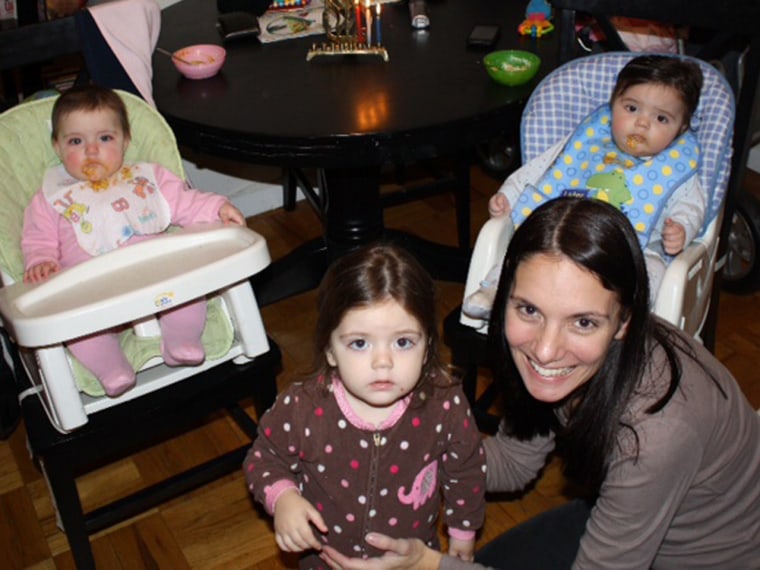Almost every parent can remember that first proud moment they heard their baby speak. But speech development can cause its share of parental anxiety -- a milestone to obsess over, and another way that competitive parenting can rear its ugly head.
Wendy Freeman Bradford, a mom of three, recalls how one child in her oldest daughter's playgroup started using full sentences way before anybody else’s baby was even close to talking.
“Everybody was saying how smart he must be because he was talking so early, how he was definitely going to be a doctor,” says Bradford. Of course by now, all the other kids have caught up. Looking back, Bradford says, “His early speech was just something we all focused on then, because we thought it meant that he was somehow more advanced and smarter.”
A few years after later, Bradford had twins, and says she often found herself comparing the children’s verbal skills.
Her twin daughter was speaking in full paragraphs while her son was still pointing at a balloon and trying to say the word. “It can be really hard to have that direct contrast all the time between two kids who are exactly the same age, under the same roof,” Bradford confesses.
Julie Masterson, Ph.D., a speech-language pathology specialist and professor of communication and disorders at Missouri State University, says sometimes the best thing a parent can do is tune out -- not your child, but all the other parents.
“Remember that every child truly is different,” says Masterson. “There’s always going to be some little Sally Marie who, according to her parents, was reading books at four months. But it’s important to tune all of that out and stay away from mommy chatrooms.”
In addition to her professional expertise, Masterson is also a parent and grandparent — so she knows exactly what it feels like to be the one lying in bed at night, trying to count the number of words your baby knows before a doctor’s visit.
That angst about baby speech milestones drove Masterson and co-author Kenn Apel, Ph.D., a professor and chair of communication and disorders at the University of South Carolina to update and rerelease their book, Beyond Baby Talk, this month, and help take the mystery out of the developmental process for a new generation of parents.
“How do you know when you should be concerned? How do you know if it’s crazy parent anxiety?” asks Masterson. “Well, knowledge is power here.” The more you know about how your child develops language and communication, the more you can look for signs that things are on track, even before a child starts using real words.
For example, a young baby making eye contact, playing peekaboo, smiling in social situations and recognizing different words (if you say “Daddy” and your child looks around the room for his or her father), are all important signs of language development. Researchers call it "pre-first words behavior," and according to Masterson, they’re the crucial building blocks that lead up to those memorable first sentences in the sandbox.
Instead of going by what other parents in the playgroup report, Masterson encourages parents to focus on resources like the American Speech-Language-Hearing Association website that offer credible information and guidance, as opposed to anecdotal evidence that can ratchet up a parent’s stress level.
Angela Rella, an attorney and mother of two young kids, describes how relieved she was when her pediatrician stepped in and prodded her to examine her oldest child’s speech progression. At her daughter’s 15-month check-up, their doctor asked Rella and her husband if their daughter had started to say any words yet. She hadn’t, and being the rare combination of a first-time parent and a relatively laid back mother, she hadn’t given much thought to whether other kids her daughter’s age were talking.
At around 17 months, Rella got a follow-up call out of the blue from the pediatrician, asking how her daughter was progressing. “I told her that she was only saying one to two words,” recalls Rella. “I thought her doctor would say, 'let’s wait until the eighteen-month appointment.'” But instead, the pediatrician recommended some testing.
Soon after that conversation, Rella’s daughter started with a speech therapist two to three days a week — and the toddler started speaking in five-word sentences within a month or two. Five years later, Rella describes her daughter as a "complete chatterbox,” and says, “when she did start talking, she sounded like an adult. It seems like she just skipped the whole babbling step.”
Parenting author, psychologist and TODAY contributor Dr. Michele Borba reminds parents of early talkers: Don’t be quick to judge other people’s kids who might take a little longer than your own to speak — and don’t feel too smug about your child being ahead of the communication curve. “It’s great if your kid has early verbal skills,” she says. “But that really doesn’t tell you anything about where they’ll be in their 20s, 30s, or 40s. There’s a lot of work that goes on in between.”
After all, she points out, a variety of unconfirmable reports suggest that Albert Einstein didn’t talk until he was 3, 4 or even 5. Just imagine how anxious Einstein’s parents would have felt if they had to contend with all those parenting posts in the baby blogosphere.
More from TODAY Moms:
28 photos of adorably geeky kids
Dad shares secrets of amazing father-daughter photos
